|
restoring our biblical and constitutional foundations
|
Chapter 8: Ministries Abroad
In the last decade God has fulfilled my lifelong desire of ministry in Ethiopia. In 2004, after 28 years of teaching, my husband received his first semester of sabbatical from teaching. This was a time that his seminary allowed, with full pay, for academic rest and stimulation. I jokingly say that, even after 28 years of marriage, my husband did not understand me because he had not been to Ethiopia. In many ways that was a true statement.
Those of us who are TCKs (Third Culture Kids) are a social enigma. We have personality quirks and shifts in values and communication styles that are confusing to most people. They cannot understand us, and pity the poor man who marries a TCK. One of the great services I rendered to my husband was to talk him into going to Ethiopia with me :) So in November of 2004 we traveled to Ethiopia, and for six weeks we ministered, we played tourist, and we visited sentimental places.
The land of Ethiopia is exceptional; it is an ancient land that is mentioned in the book of Genesis as well as in Revelation. It is steeped in ancient tradition not unlike the Chinese. It is the only country in Africa that was never colonized (though it was briefly occupied by the Italians during WWII). They say that the end of the era of colonization started in Ethiopia when Ethiopian warriors defeated modern Portuguese soldiers at the Battle of Adwa in 1888. Although we know of the Apostle Phillip’s introduction of the Gospel to an Ethiopian official in Acts 8, the roots of Christianity in Ethiopia are officially dated ca. 316 when two European brothers were captured from a passing ship in the Red Sea and brought up the mountains to the Ethiopian king of the Aksum Empire. They told the king of the Gospel, and the king and all his court were converted.
These two men, named Frumentius and Edesius, stayed in Ethiopia voluntarily to disciple the new believers. Then they requested of the Patriarch of the Coptic (Egyptian) Church to send priests to continue the development of the church in Ethiopia. All of this transpired in the decades immediately following the placement of Constantine as Emperor of the “Holy” Roman Empire. When Constantine came to the throne, the church was highly persecuted. He reversed that and instead took over the church himself, organized it into five divisions, and chose a patriarch to supervise each division. The Coptic Church was one of those divisions. The Patriarch administered from Alexandria, Egypt. As history would have it, in the centuries following Constantine the Roman division separated from the Eastern divisions. The Roman division became what is now known as the Roman Catholic Church. The Eastern division became know as the Orthodox Church. Each Orthodox Church has its own Patriarch. And each Orthodox Church has close ties to its country’s political system – for example, Russian Orthodox Church, Romanian Orthodox Church, Greek Orthodox Church, etc. Because of this close association between the Orthodox Church and their government, to be “orthodox” is to be “patriotic.” National identity and religious affiliation are closely tied. In the case of Ethiopia, the church came under the Patriarch of Egypt until 1958. Today, Ethiopia has her own Patriarch. My husband Dave met with the recent past Patriarch Abuna Paulos.
Abuna Paulos died unexpectedly in 2012, and now Abuna Mathias serves as the head of the Ethiopian Orthodox Church. In the United States there are branches of the Ethiopian Orthodox Church. There are bishops and priests serving these churches, the same as in the churches of Ethiopia.
When Frumentius first brought the Gospel to the king, it was the true Gospel of the apostles. But as with so many church affiliations, with the passage of time the Gospel became corrupted in these Ethiopian churches, such that today it is difficult to find the simple message of Jesus Christ who is alone the Savior of the world. In the far north of Ethiopia around the city of Labella, there are stone churches. These churches were carved from one huge boulder in the 1100s.
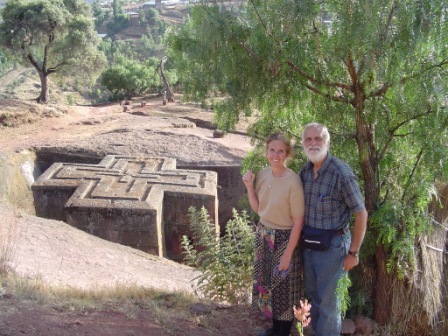
They were carved with primitive tools, yet they are perfectly symmetrical in every detail. It is amazing to see these churches with functional rain gutters, baptisteries, windows, doors, and steps, all in perfect harmony. Ethiopian lore says that these churches were built with the help of angels over a period of only 28 days. Many faithful Orthodox have traveled to Labella as a way of doing homage, and upon their deaths were placed in burial crypts. I remember in 2004 seeing skeletons and mummified corpses in open burial enclaves. Somehow they thought that to die at one of these churches and to be laid at rest in a stone opening next to the church would elevate their chances of reaching God in the afterlife. After our visit in 2004, the Ethiopian government removed all the corpses feeling that they were distasteful to the many tourists coming to the area. I feel sorry for those poor souls who relied upon their place of burial to secure their place with God.
In 2004, Dave and I had an opportunity to visit these famous churches as well as the Blue Nile (and Lake Tana, headwaters of the Nile River), and the ancient palaces in Gondar. I have always loved history, and it was exciting for me to see these historical places in Ethiopia. Dave and I had no intention of an extensive ministry in Ethiopia when we went in 2004. But God had other plans. The night we arrived in Ethiopia, Dave laid his head on the pillow in the guesthouse and he said to me, “I love these people so much its hurts.” I knew at that moment God had answered a lifelong dream of mine. He had work for us to do in Ethiopia!
In the six weeks we were there, Dave taught in several Bible schools and I worked in a rural mission clinic. In addition, we visited my old mission homes (which were still standing). It was really exciting to be received by the Ethiopian people. Everywhere we went, when they discovered that I was an MK (Missionary Kid), they embraced me as one of their own.
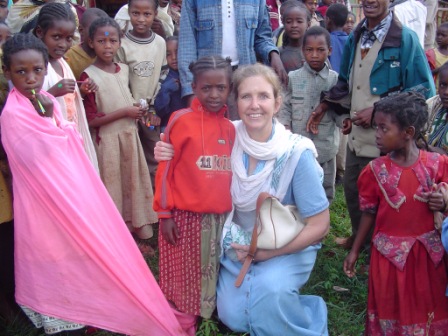
Many of them remembered my father and mother and they often said to me, “Your parents opened heaven to us,” “your parents are our father and mother,” “your parents gave us life.” This happened especially when we came to Burji, a little area in far southwestern Ethiopia. The people were so happy to see me. Since the Soviets had thrown out the missionaries from Burji there had been no effort by the outside world to help the struggling church in these mountains. No one in the capital city knew how we could get to Burji. “You can’t get there from here,” they told us. But I was determined to get to Burji, so we set out not knowing how we would get there. In the providence of God, where Dave was teaching the Gospel of John there was a student from Burji! This student promised to take us there. There was a rickety old bus that must have been 100 years old that traveled from the two-lane, pot-hole-filled road called the “Pan African Highway.” This Burji student got us seats on this bus. According to Ethiopian custom, we white people were placed in the front seats. I was so excited to be going home that I could hardly contain myself. Everyone wanted to know who we were and why we were all the way at the end of the world. I explained that I was Burgynia, and that I had grown up in Burji. They were amazed that I had returned. One man on the bus was an evangelist from Burji; he was so excited to hear that my father was Tex Lapsley. He had heard of my father, and he said, “Your father has the reputation of being a hard worker.” We gave this evangelist a book in Amharic that we had brought with us. Immediately he began to read the book; he was so excited at this gift!
We arrived in Burji unannounced and were taken to the guest house, which comprised a row of five mud walled rooms with two single beds in each room. No table, no chair, no rug. We lay down exhausted and were then treated to a wonderful tradition that still exists in Burji. Worku and some others brought a basin of water to wash our feet. It felt so good! It was very humbling and a great spiritual ministry to us. As news of our arrival spread, people came from all over to meet us. They gathered two mules to take us over the mountain from Soyama town to our mission station at Gambo. What a precious gift that trip was from these people and the Lord! For three hours we rode and walked in the back hills of Burji, finally arriving at the place I called “home.”
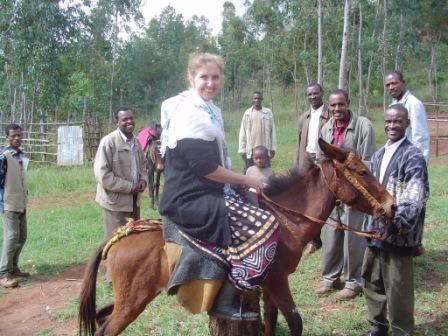
The school my father had built was still standing. It was being used by the government for a public school; though dilapidated, it was still functional after fifty years. My home was also standing, and it was in very good shape and was being used as the school offices. What a joy it was for me to wander through that home and to remember times of sweet blessing!
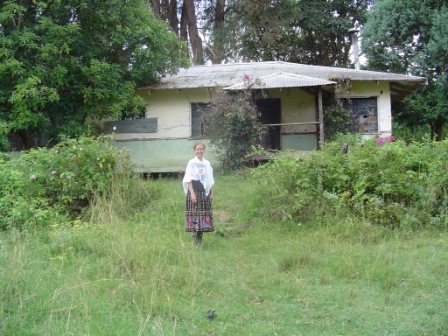
Two years later in 2006 I took my parents back to Burji for their last time. My mother had brought a rose bush from Nairobi, Kenya in 1963 and had planted it in front of our house. That rose bush had spread and spread and now comprised a large area. We dug up a cutting from that bush and today that Burji rose bush is now at our farm in Virginia, at my parents’ home in Dallas, and at my sister’s home in Houston. We left Gambo carrying rocks from the place. The Ethiopians thought we were crazy, that we would waste our energy hauling rocks. But today I have a little rock from my Burji homestead in my home at Bradford hall. I thank God for these little memories.
That six week trip to Ethiopia dramatically changed our lives. Both Dave and I had a renewed love for the Ethiopian people and had sensed that God had work for us to do there. This work began with a little boy named Bereket. (Actually his birth name was Azanaw, which means “sorrowful.” But after his rebirth in Christ we changed his name to Bereket, which means “blessing”). We had met Bereket in the last days of our trip in the Felasha (Jewish) village in Gondar. He was about 15 years old. He had corneal damage when his eyes became infected after ritualistic tribal markings were done on his eyebrows. Bereket was working in a little shop. He was intent on selling me a little lunch basket of woven grass and goat skin that had been made by hand. I was not interested in buying the basket, but I was interested in the boy holding the basket. I eventually bought the basket and he gave me an additional basket just for fun.
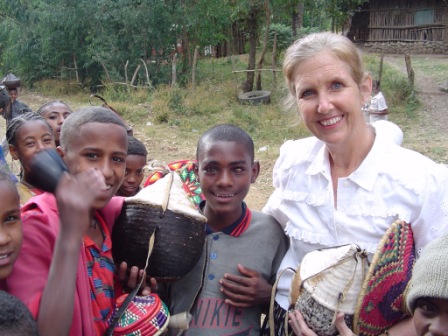
I did not want to be rude about his eyes, but I felt as a nurse that something could be done to ease his blindness. I got his name and his father’s name (he had no address) and I left that Felasha village, asking the Lord to show me how to impact this boy for Christ. Upon our return to the U.S., God guided me to a doctor in Gondar, who was willing to drive out to the Felasha village and find Bereket. Her evaluation concurred with mine, and by the grace of God she arranged for him to be evaluated by a transplant surgeon in the capital city. Over the next two years funds came in for Bereket’s transplant, and he was flown from Gondar to Addis. I thank the Lord for the Meserete Kristos Bible School that gave him housing and care in the weeks following the transplant. During this time, against the backdrop of love he had never experienced before, he accepted the Lord as His Savior. Though for a brief time he had perfect vision, eventually the side effects of anti-rejection medications created glaucoma and other problems such that his vision again deteriorated and nothing more could be done. We set Bereket up in a dairy business and today he still lives in Gondar running his business and attending the Meserete Kristos church in Gondar.
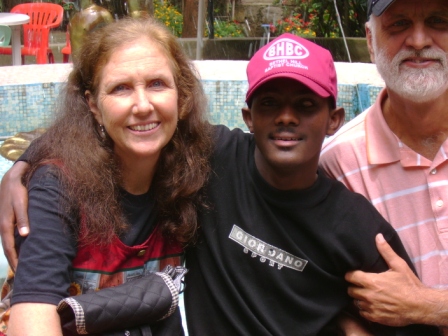
In 2005 Dave taught an 8-week Greek course at the Evangelical Theological College in the capital. We videotaped this course, and through the generosity of others were able to make it into a 24-DVD set that is now allowing people all over the world to learn the Scriptures in their original language.
Also in 2005 we began a Bible distribution program in Burji. When we had left Burji, the cries of the church elders were, “Don’t forget us!” To this day I can hear their pleas in my ears. Burji is so far away! There are no bookstores where Christians could obtain a Bible. Even if they traveled the long distance to a town large enough to sell Bibles, the cost of the Bible was prohibitive for them. As a result, very few individuals in Burji owned their own Bible. If a family had a Bible it was guarded very carefully. We felt it best not to give the Bibles freely but to give them as an award for completing a Bible memory program (like the BMA ministry of my childhood). We selected nine passages of Scripture that were to be memorized perfectly and recited to the church elders. These passages included Psalm 1, Psalm 23, John 3, John 14, Romans 8:28-39, 1 Corinthians 13, and Phil 4:8-12.
Over the years it has been so pleasing to us to watch the Lord create in the believers in Ethiopia an eagerness for His word. Whenever we have gone to Ethiopia, or taken teams to Ethiopia, we have had the privilege of listening to them recite their verses and of presenting them their own Bible.
It is forever etched in my memory the first time we distributed Bibles. The people raised their Bibles over their heads and singing a happy song; they danced from one end of the church yard to the other and back again. Oh that we had this love for the Scriptures here in the United States! I purposefully have not kept count of how many Bibles have been distributed. God instructed to me the instruction of King David to not count the people. I did not want to count because it could yield pride and self sufficiency. My guess is that at least 10-12,000 Bibles have been distributed as a result of this memory program. The Bibles have gone to young people, to elderly people, to handicapped people, to nursing moms; all strata of society have embraced this Bible memory program. And the Bibles that have been given have been in their own language. The word of God that will last forever is now in the hands of thousands of people by His grace.
I remember the day when I was in my kitchen in America and I reached for a pair of reading glasses. As I reached for those glasses I thought to myself, “I wonder if they need glasses in Ethiopia.” So I went to the Dollar Tree store and gathered an assortment of non-prescription reading glasses for a dollar each. I made eyeglass cases and cleaning cloths, and we distributed them on our trip in 2004. I can still remember giving the last pair of glasses to a church leader in Burji. He literally broke down crying and he said to me, “Our evangelists have been crying out for glasses!” It is amazing how a simple one dollar investment can change the life and ministry of an individual. In the years since that moment, we have taken thousands of non-prescription eye glasses, and many women have joined me in sewing the eyeglass cases. We give these glasses free of charge after testing each person.
One time, in a village called Kalicho in Burji, I was testing a Muslim leader. My routine was to have people bring their Bible, and then I would place glasses of different strengths and have them read again. This man had no Bible, so we borrowed a Bible and I had him read from Romans 8:1: “There is therefore now no condemnation for those who are in Christ Jesus.” What a joyful way to present the Gospel to a man blinded by Islam! I have always said, humanitarian work is wonderful but it must be done side by side with a presentation of the Gospel. We do not do humanitarian work in order to butter people up and make them feel good about us so that we can present the Gospel – No, No, No! We present the Gospel as we are doing the work. So while our hands are doing the work of giving glasses or food or clothes, at the same time our mouths and our eyes are presenting the Good News that a Savior has come.
In another village in Burji on another trip, I was in one-room mud-walled church distributing eyeglasses. The church leaders came to me and said that a Muslim leader wants a pair of eyeglasses. I will be honest with you, my heart cried, No! These are for my brothers and sisters! But God quickly convicted me, and I invited him to come in and sit down. He came in and sat looking straight ahead. He did not greet me; he did not even look at me. I went through my routine: I tested his eyes, I found a pair of eyeglasses, and I had him read for me. Then the Spirit of God said to me, Make sure he knows where these glasses came from. So I folded the glasses and placed them in the case, held them in my hand, and said to him, “I want you to know where these came from. These glasses did not come from the United Nations; these glasses did not come from a health organization; they did not come from the American or the Ethiopian government. These glasses came from people who love Jesus. Jesus knows you and Jesus loves you, and Jesus told people to send these glasses to you. And every time you wear theses glasses you will think of Jesus. He is alive, He is in heaven, He sees you, He knows you, and He loves you.” With that little speech I handed him his glasses. He never looked at me, he never said thank you, he remained as hard as when he had first sat down. I went on to the next person waiting for glasses. The church leaders told me at the end of the day that the Muslim leader stayed around the church for two hours and when he left he said, “I have never seen such love as in this place.”
Two years later we were applying to the government for permission to open a rural clinic in the vicinity of this church. It was known as a Muslim village and group of young Muslims did not want anything Christian in their village, even if it was something to help the people like a clinic. These young Muslims drafted a letter requesting the government not to give us permission. They brought the letter to their village leader to sign. The first person they brought the letter to was Mr. Eyeglasses man. He raised his right hand and said, “My hand refuses to sign this letter!” And then he explained to them: “No one loves us except these Christians. Our Muslim leaders only want to put money in their pockets. Our government does not care for us because we are so far away. The only people who want to help us are these Christians. I cannot sign this letter!” After his refusal, the other Muslim leaders also refused to sign, and within a few months we had a license to open our clinic.
Our clinic consisted of 3 dilapidated cement block buildings. Two buildings were housing for medical staff, one building was storage for medical supplies, and one building (six rooms) was the clinic. It had been abandoned from the Micah Project many years ago due to lack of funding and interest by the outside world. These buildings had all remained empty. We began the work of renovating the buildings, of installing solar power for electricity, of installing a water harvesting system with solar hot water, and of building a waiting shelter and a guard house.
We stocked the clinic with the items needed for basic medical service. In addition, we made the big expenditure of buying a long-bed Land Cruiser to serve as an ambulance. The clinic had a staff consisting of a pharmacist, a laboratory technician, two nurses, a registrar, two guards, and a house keeper.
The primary purpose for this clinic was not medical work but evangelism. So from the beginning we had a full-time chaplain named Solomon. In addition to the love and care of the nurses, every person that came to the clinic was introduced to Christ through posted signs about Christ, through a loudspeaker playing Christian songs and Bible teaching, and through the chaplain praying, visiting, and teaching (often using flannelgraph) to waiting patients.
On many days the clinic chaplain could be seen walking through the village discussing the Lord to people who had been to the clinic. A village leader (who was Muslim) strongly resented the fact that Christian work was in his village. One day he called a village meeting and prompted other leaders to say to the people, “We do not want this clinic; it is not helping us.” Immediately all the people rose up and said to them, “We do want this clinic; it is a big help to us!” On one of my trips to Burji, two men stood up in a public meeting to express their thanks to me and to all those who had sacrificed to give them an ambulance. They gave testimony of how the ambulance had saved their lives when the Gujis had attacked them. Many people have come to the Lord through the ministry of the clinic, and we praise Him for the opportunity to have done this work.
At this time, Burji had no electricity except some very unreliable current in Soyama town. God gave me a vision to establish solar power at various churches and with that power to establish interior lights for evening Bible study, a microphone for preaching, and a loudspeaker with a DVD player for music and Bible teaching that spread to the countryside around the church. By God’s grace we were able to establish this system in five churches in Burji. This represents about 20% of the Burji churches. I praise God for the expertise of Ed Johnson and Danny Chambers as they established these systems and taught Bange and Oshe how to maintain them. For the churches where we could not place these systems, God introduced me to a product of Global Network Recordings called the SABER.
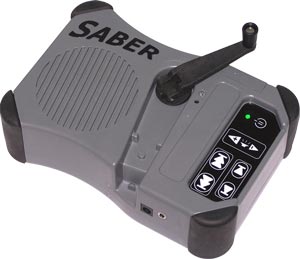
This sturdy handheld recorder had an internal battery that could be charged by solar or by DC (direct current). Additionally, it could be powered by hand-winding. The player had an internal memory for permanent storage. It also had SD card capability. I purchased 25 of these SABERS and put the Amharic book of James on the internal memory. By the grace of God and the generosity of the Mekane Yesus Church in Addis, we were able to get the Amharic and Oromo translation of J. Vernon McGee’s “Through the Bible” study. Additionally we were able to get copies of radio broadcasts that SIM had done in Ethiopia. We established a library (similar to the one I had established at the College Church in La Mirada in 1978) with hundreds of messages. The messages were put on CD for broadcasting over the loudspeaker churches and on SD cards for use in the SABER churches.
God has used this ministry greatly. Let me tell you just two stories. One of the loudspeaker churches is Kilicho. One night the church was having a praise service, and it was broadcast over the loudspeaker. This is one of the villages that the Muslims claim as their own.
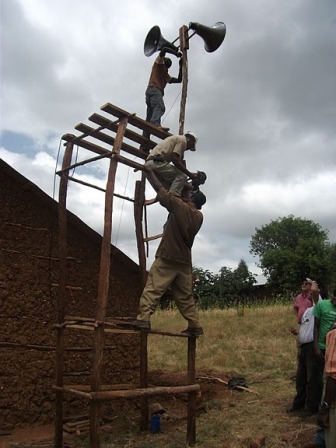
They began throwing rocks at the church. Several rocks broke through the tin roof, but thankfully no one was seriously hurt. The Christians called the Burji police to the scene, and the Muslims were told very definitively that the Christians had the right to worship any way they wanted and that the Muslims cannot dictate religion. That encounter brought on by the loudspeaker set the tone for peace in Kilicho, and the Muslims all across Burji settled down. In the village of Wordaya, the Christians were gathered listening to the SABER. The volume of the SABER can go quite high so it can accommodate quite a large group. Nonbelievers from the village gathered to listen. I do not know what passage they were listening to; perhaps it was from the Gospels where Jesus was healing people. But after the meeting a Muslim man came to the church elders and asked them, “Does Jesus heal?” They replied, “Yes!” The man then proceeded to tell them that his son had a bleeding disorder. He had spent his life’s earnings taking his son to numerous medical facilities, the witch doctor, and the Muslim imam, all to no avail. So he brought his son to the church elders, and they prayed over him. The power of Jesus healed him instantly. News of the healing spread, and soon many Muslim families were coming to Christ and a great revival broke out in that village. This is the same village where an elderly Ethiopian evangelist had been preaching many years before. Their hearts had been so hard against the Gospel. The evangelist planted a little tree and said to everyone, “This tree is a testimony, and when it is grown you will come to Christ.” That tree is now grown. We have been told that non-believers who work in the fields are singing Christian songs they have heard from the loudspeaker. We trust those songs will become the root of their rebirth.
In addition to Burji, Dave and I began working in a town called Alaba. It has always been a Muslim stronghold with direct ties to the Middle East. I could tell you story after story of God breaking through the darkness of Islam with the Gospel. I know several Muslim leaders to whom Christ personally visited who are now strong Christian leaders. And it has been our privilege to come alongside them in the work of evangelism. I was introduced to Alaba as a young child. We had to go through Alaba when we traveled on horseback to get to my mission station in Bobitcho, Hosanna. Even at that young age, I could sense a spiritual darkness. The inn where we used to stay is still standing. It is as real as my memories. Alaba town sits on the Bilatte River. The Alaba district lies in the Great Rift Valley. As such it is ridden with malaria and typhoid. At any point in time, one third of Alaba’s population is sick with malaria as well as with typhoid and typhus.
Our own work in Alaba began in 2005. For several years we had been sponsoring a student at the Evangelical Theological College (ETC) in Addis Ababa. This student came from Alaba. One day he wrote an email to us. It simply said, “We lost one.” This confused me, so I wrote back, “What do you mean by ‘We lost one’?” Then he explained that a young Muslim man had murdered a young Christian aged 19. Our heart was moved with compassion for the parents of the 19-year old as well as for the young Muslim man who had done the killing. So in the summer of 2005, while Dave was teaching at ETC, he and an Ethiopian friend of his took a weekend to go and comfort this family.
After visiting with the family, Dave went over to the prison to meet the murderer. His name was Muhammad. Each time we went to Alaba after that we always made a point to get to the prison to see Muhammad. We would bring him a blanket, a pair of shoes, or a shirt, even a Bible he had asked for. One day as we were getting ready to leave, Muhammad said to us, “I’m ready.” We asked, “What are you ready for?” He replied, “I am ready to declare that Jesus Christ is Lord.” So in that prison he raised his hands toward heaven and before everyone declared, “Yesus Getano!,” “Jesus is Lord!” In Alaba, those are fighting words! Then he said to us, “My mother and father will forsake me, so now you are my mother and father.” We joyfully became his Christian parents!
Muhammad began a Bible correspondence course, the church evangelist met with him weekly for discipleship, and the Spirit of God began his redemption. The change in Muhammad was dramatic. On one visit I asked him how it was going with the other prisoners, meaning the other Muslims in the prison. He replied, “Oh, they want me to come back, but I am not afraid of them.” Soon the prison director was placing Muhammad in positions of leadership, and then he recommended him for early parole. Muhammad left the Alaba prison after serving only 75% of his term, a new man by the blood of Christ. Today Muhammad is living and working in Addis, the capital. We have the original copy of his pardon in our safe deposit box.
Our work in Alaba over the years has been very different from our work in Burji. The primary need was for assistance in building church buildings. In the Muslim mind, a building represents territorial control. In about 2004, one Middle Eastern country donated millions for the building of mosques in Ethiopia even where no Muslims existed. These mosques were placed in strategic locations along major roadways to communicate to everyone, “This is Muslim territory.” This had an intimidating effect and assisted greatly in the conversion of people to Islam. In Alaba, the rural Christians were meeting in private homes (huts), which had no significance to Muslims. So by the grace of God we built about 14 simple church buildings. As a result of these buildings, many Muslims who had been afraid gathered the courage to convert to Christ.
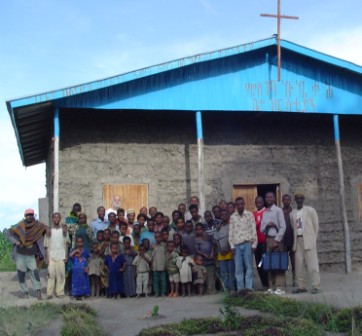
I remember one time being in one of these new church buildings. We were holding an agricultural workshop. We had invited people to come and listen to myself and Lloyd Williamson (who was an agricultural specialist in Virginia). We discussed the necessary ingredients of soil for maximum yield and the principles of water preservation and soil erosion. At the end of Lloyd’s talk, I distributed seeds. We asked the people to divide into groups and to elect a leader from their group. I gave a sack of seeds to each leader to distribute to his group. Before I gave the seeds, I said to the group, “I want you to know where these seeds have come from. These seeds have not come from the United Nations, or from the American government, or from the Ethiopian government. These seeds have come from people who love Jesus to help you.” As I was giving my little speech, a Muslim man, sitting on the first row, interrupted me: “Is this the last thing we have to listen to?” I sweetly replied, “Yes,” and I continued with my little speech. In my experience, Muslims will always fight even over the tiniest seed. I did not like to be in such a confrontational atmosphere. Christians never argued, but the Muslims always discussed and argued. I left the church and went around to the hut in the back. This hut belonged to the Christian man who had started the church and had donated the land to the church. To my amazement, Mr. Interrupter followed me. We stood back there by the house and he said, “I think the way of Jesus is the right way.” “You do?” I replied. “Why?” He then went on to explain that he had observed the donation of the land for the church. He said, “You have left America, and no one is paying you to come to this poor place. It has cost you much money to serve us. I think the way of Jesus is the right way. But we Muslims make life difficult for Christians. My brother became a Christian and he had to flee far from here. We burn their houses, we burn their crops, we kill their animals, and we put them in prison.” I replied, “Yes, you do all these things, but Jesus is still with us. He does not leave us, and He gives us a joy inside that is stronger than anything you can do to us.” I continued, “Jesus said, ‘What does it profit a man if he gains the whole world but loses his soul?’” The man looked at me and said, “Will you pray for me to make the right choice?” I do not know this man’s name; God knows who he is. But still today I am praying that this man will make the right choice.
This little story is representative of life in Alaba. Much of our work has been to encourage those who are persecuted, to help the very poor, and to facilitate the work of the evangelists. When we started working in Alaba, Osama bin Laden had just risen to fame. Huge posters with his photo were all over Alaba, and many Muslim men in Alaba grew beards at that time. When questioned about it they replied, “We want to help Osama hide.” As I have said, these Muslims have direct ties to the Middle East. Once, just a few days before we arrived, the Ethiopian military raided Alaba and closed down several terrorist training camps. For these reasons, most white people are afraid to go to Alaba. But God has removed all fear from us, and it had been our joy to stand side by side with these brethren in these past years.
The last place in Ethiopia we have been honored to work is in the Northern city of Gondar. As word of the Lord’s work through us in Burji and Alaba spread throughout Ethiopia, Dave and I were bombarded with pleas for help in other locations. One of these pleas came from the elders of the Evangelical Churches Fellowship (ECF) in Gondar. They had a heart to plant churches. This area (northwestern Ethiopia) is strongly Orthodox. The ground is very hard for the Gospel. Persecution by the Orthodox was high, and funds for evangelists were not available. So we signed a partnership agreement with five sending churches whereby we shared the salary to send evangelists into unreached villages. It was a three-year agreement, and each year we paid less and they paid more of the evangelists’ salaries.
Exciting stories came out of this work. Let me tell you three.
1) In the Orthodox Church there are many believing priests. Two of these (Dawit and Enetu) had worked undercover within the Orthodox Church by starting Bible studies and leading people to Christ. Twice they were discovered by the church authorities. Once they were imprisoned and once they were stoned out of town, but still they remained faithful; they just moved to another village and started again. In the goodness of God, those who came to faith under the nurture of these two men are still meeting today growing in the grace and knowledge of our Lord Jesus Christ.
2) Muluken, an evangelist, arrived in a village and was going to visit the people. As he walked down the street, the witch doctor came out to greet him. The witch doctor hated the name of Jesus Christ, and by satanic power he called forth a swarm of bees to attack Muluken. All the people were watching, but without hesitation Muluken raised his hand and said in a loud voice, “By the power of Jesus Christ, I command you to stop!” Instantly the bees left. When a year later we visited the church planted by Muluken, there sat the witch doctor. He had come to Christ, praise God!
3) Fantehun was an evangelist who took an unreached area close to the Sudan border; he and his evangelist partner were building a house there. In that area of Ethiopia, houses are built with a mixture of branches and tall grass. It is very, very hot there. The walls are open for the breeze, and the roof is made of this tall grass. Fantehun had out his long scythe and was cutting the grass when a poisonous snake bit him on his bare feet. He was carried into the unfinished house and told, “There is no medical help here; we can only call the witch doctor.” Fantehun declared, “Never! I would rather die than to leave Jesus!” He was comatose for several days, but by God’s grace he was healed. He continued on with the work and saw many come to Christ in that area.
In summary, as you can see how God used the things early in my life to facilitate the things later in my life. Ministry simply means serving others as the hands and feet of Jesus. It simply means influencing others for Christ. It has nothing to do with formal education, official titles, or paid salary. I am so glad for the wisdom of God in arranging His church such that ordinary people become His ambassadors. In the last year we have partnered with the Peniel Gospel Team in India. This is a group of evangelists working in churches and orphanages and in a Bible school to advance the Gospel in a largely unreached area. It is in the “bridge” surrounded by Nepal, Bhutan, and Bangladesh. It is our great joy to join hands with them in this work. We are currently representing them to other believers through our website, and we are funneling funds to them according to designated gifts.
One of our great concerns at the moment is the building of a Christian school that will be a supply of funds in the future with this ministry. If the Lord keeps me here for more years, then I expect to have stories to tell about India just as he has given me stories to tell about Ethiopia. Our heart is turning to unreached people groups in this regard. Not only have we embraced India but we have embraced a new work in Burji – a laymen’s training center in the Suggen Valley that will not only develop strong Christians in the rural churches but will also send these believers into neighboring tribes along the Ethiopia/Kenya border, where they have not heard the name of our Lord Jesus. Will you pray with us that God would raise up an army of soldiers to march into Northeast India and Southern Ethiopia to win over these unreached people with love and with the truth of the Gospel? For more information and for current updates of this work, please visit www.daveblackonline.com See the India/Ethiopia Files as well as the Blog.
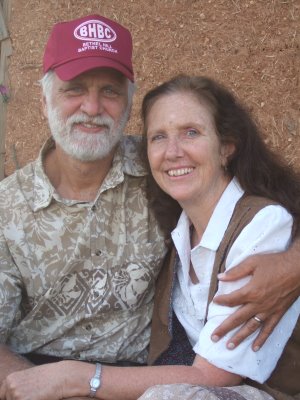
October 7, 2013